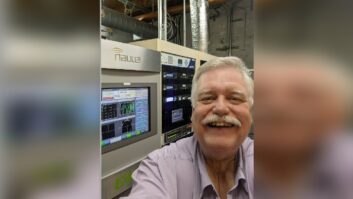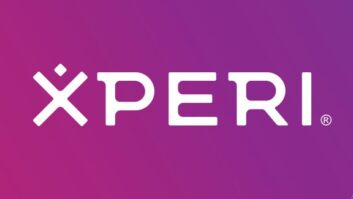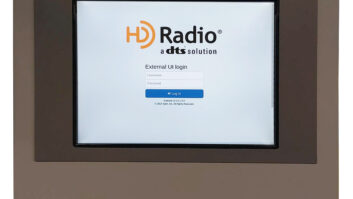Ed De La Hunt, 68, founded a broadcast company with his wife in 1962. It is based in Park Rapids, Minn., and now includes three AMs – including his first, KPRM at 870 kHz – plus three FMs and three pending AM CPs; and his son owns another FM that is run out of the same facility.
He’s been a county commissioner, a member of the National Guard and Air Force Reserves and president of the local county Republican party. Of his eight children, five are engineers.
One thing Ed De La Hunt is not is a fan of digital radio as it is currently being implemented in the United States. He told me by phone that HD Radio on AM “is going to be a disaster.” As he talked about it, he became more and more animated.
I asked this small-town, multi-station owner to comment further about his perspectives on digital.
Q: You sound worried about the future of radio.
De La Hunt: More concerned than worried. The whole digital scenario is being based on the big markets. Everybody is forgetting about the small markets, where profit margins, if they exist, are very narrow.
The other day I closed 30 schools because of the weather. I was wondering if I could have done that any better on digital as on analog. I wonder how many people in the next 20 years are going to have these newfangled radios.
We cover a rural area, a farm area. Some of these people have a single light bulb hanging from a wire on the ceiling and an old radio. I wonder how many of these folks would be able to buy a new radio.
Any digital transition, with the economy such as it is for small broadcasters, would mean the laying out of additional money. With most small AM stations, money is a nonexistent commodity. You’re running the facility and you’re serving the community; but to lay out big money and to pay somebody a license fee to use what you already have …
The only thing we’re allegedly going to get is to eliminate some noise. They’re talking about only having your current coverage with digital. I sit here with a 25,000-watt signal to cover my community. I’m happy with what I have, thank you.
It seems foolish to me to buy any kind of system that obsoletes what we already have.
Q: Proponents say the HD Radio approach gives an owner the choice of whether to do digital.
De La Hunt: I don’t want both. There’s a lot of other places I can put the money. Doing some extra services for my community. Broadcasting a ballgame even though I only have two sponsors.
I think we need some improvement in the AM spectrum. But the approach we’re taking, reducing the frequency response to 5 kHz, is an absolute joke. It’s only being done as a way to precondition for IBOC, in order to allow eventually more stations to be shoved into the spectrum than we already have.
I have 20 stations from other markets (received) in my town. I don’t need 40 or 50 just because all of a sudden everyone’s digital.
Q: Your biggest concerns are …
De La Hunt: The cost to convert. And the fact they’re going to take away from me what I currently have.
I like skywave, I’m sorry. I like it! When I’m coming back from the Twin Cities and drive 250 miles, all I can say is, “Thank God for WHO.” It keeps me company. But that’s just the cherry on top of the sundae. The sundae is taking care of your local community, just as you are today. If you do that, you’ll do OK. You don’t need someone to pile some new technology on top of you.
I’m concerned about the cost. I’m sorry, but if I’ve got a 1 kW radio station, before I spend $150,000 on Ibiquity, I’m going to spend $10,000 on a new solid-state transmitter and cut my power consumption.
Q: What do other AM owners say?
De La Hunt: The small ones think it’s ridiculous. I’m involved with the Pavek Museum of Broadcasting, and I rub elbows with them there. A lot of them say, “If it gets to that point, the hell with it, we’ll just shut it off.” They’re not going to spend that kind of money on an AM station.
Another thing. There’s been an absolute effort on the part of FM stations for 20 years to “sell down the AMs.” The young people today are so FM-oriented, you’ll never get ’em to go back. You could have it so that you turn an AM station on and a six-pack of beer pops out and they still won’t listen. So a lot of AMs are sports- and news-intensive; it’s a scenario they won’t get on FM. They’ll listen to AM for that. But people don’t want to listen to radio in CB quality at 5 kc.
Our last proof, four or five months ago, we’re flat out to darn near 10 kilocycles. It takes some effort to get it there and control it there, but people say our AM sound incredible. We have five engineers in our family, five consulting engineers, professional and licensed. Every single one of them is hell-bent to keep our AM station sounding as good as they possibly can.
Q: You’ve been in the business for more than 50 years.
De La Hunt: I started in Twin City radio in 1958. I was a design engineer building color TV sets and went into the radio business as an engineer, moved up to no man’s land at Thief River Falls, where I got my taste of small-town broadcasting. My wife and I filed for the Park Rapids frequency at 100 watts – the sheriff had 150 watts more than we had.
We raised eight kids, and five of them are engineers, PEs. One is with Carl T. Jones, my daughter Cynthia Jacobson. David is here and owns KSKK(FM). My son Matthew is the engineering director of SAIC and manages the Armed Forces Network worldwide.
My son Butch just left the FCC; he’s back with us. [He was associate chief of the Audio Services Division and, later, deputy chief of engineering]. You say “IBOC” to him and his eyes light up; he thinks it’s the greatest thing since sliced bread. The rest of the family says “No, no, no.”
It’s an FCC “thing,” like AM stereo was. They don’t look at the solid technical stuff, they look at who they like and don’t like. They don’t like Leonard Kahn. They didn’t like him before and they don’t like him again.
Q: So what’s your alternative to HD Radio? What is the best practical path for industry to take?
De La Hunt: Let the broadcasters choose their own technology. Don’t try to drive them with a standard. A lot of people say no one listens to AM now. Well, if no one listens, let the AMs do what they want within the current bandwidth standards.
On AM I think the majority of small-town broadcasters will go to Cam-D. We’ll not go digital on FM; we’ll go with the system [FMeXtra from Digital Radio Express] that gives us additional channels for $9,000.
I bought a Kahn stereo system in the hope that the marketplace decision would be a marketplace decision. Then the FCC mandated that I had to immediately turn it off. I’m scared of the commission once again being run by a bunch of bureaucrats mandating what we have to do, based on what they perceive to be a marketplace decision.
I know government. Government thinks they’re right, and when they think they’re right, they mandate. The living proof is what they did with the C-QUAM system. They absolutely destroyed the concept of stereo on AM. I think at the time of that debate we had a fighting chance to light up AM again.
It’s tough enough for the small AM broadcasters to make it now. A lot of owners unfortunately are running them as just a dumping ground. If they happen to have an FM, they’ll concentrate on the FM, but when it comes to a sale, they just “throw in the AM.”
I’ve hired people who have been with FM-only operations and they say, “Sell AM? We never do that.”
I bought an AM station from a big conglomerate. They were so concerned about spending any money on that facility, they had it cranked back to 10 percent modulation so they wouldn’t burn out the tubes! The coverage was about four miles! We fired up the air compressor, cleaned everything out, cranked the modulation up and we had coverage up to 25 miles.
Everyone in that town even today has a hell of a time supporting the AM. So we took a lot of our content including the Vikings and Twins and moved them over from FM, and everyone’s listening to it again.
Let the AM broadcasters choose a system they want to choose and let it fly from there. Don’t let the commission ever choose a standard or say to the AMs that they can’t do this.
Also there’s no radio station at local sunset that should have 6, 7 or 8 watts. Every radio station in the U.S. from 6 a.m. to 6 p.m. should never operate at less than 100 watts.
I wish someone would give Leonard Kahn a fair shake. He’s eccentric, but he’s a genius and a friend. Just let his system be part of the discussion. Don’t take on any standard, let it be part of the whole show and let the broadcasters themselves decide. If I want to run Leonard’s system, let me. The guy down the block wants to run Ibiquity, let him. May the best man win. It’ll be the Cam-D.
Q: Would you encourage someone to get into AM? Doesn’t sound like you would.
De La Hunt: It depends on what the facility is, the location and whether or not you can improve it. Anybody today in a small market with less than 5 kW, preferably 10 kW, doesn’t have a prayer, unless they’re an old, old timer, or they’re in North Dakota where the conductivity is great and goes forever. Me, if I don’t have power they won’t hear me downtown.
Q: You get emotional talking about this.
De La Hunt: When the guys went to the Gulf War the first time – we made a Valentine to send them. It covered from one side of the street to the other and everyone came down and signed it. Some guys flew it over the street. We had 1,500 people standing downtown on Valentine’s Day posing with this picture. We worked on it with the newspaper and the rest of the community.
When the Twin Towers got hit, we went on the air and we collected money to help. We sent $25,000 cash to the Salvation Army in New York – not the national, to New York. We did that on the radio.
I don’t need digital to do that. It’s not going to make my fundraising any better, it’s not going to make my community service any better.
I don’t own these radio stations. I own the equipment. I’m a franchise holder of a license to serve the people of this country. Broadcasters need to come back to the idea that they’re here to serve. If they don’t want to come back to that, I guess they deserve what they get.
Thank God I lived through the era when AM was so important and public service meant everything, and you actually had to show the commission how many public service programs you ran.
Write to Radio World with your thoughts on this or any article at [email protected].











